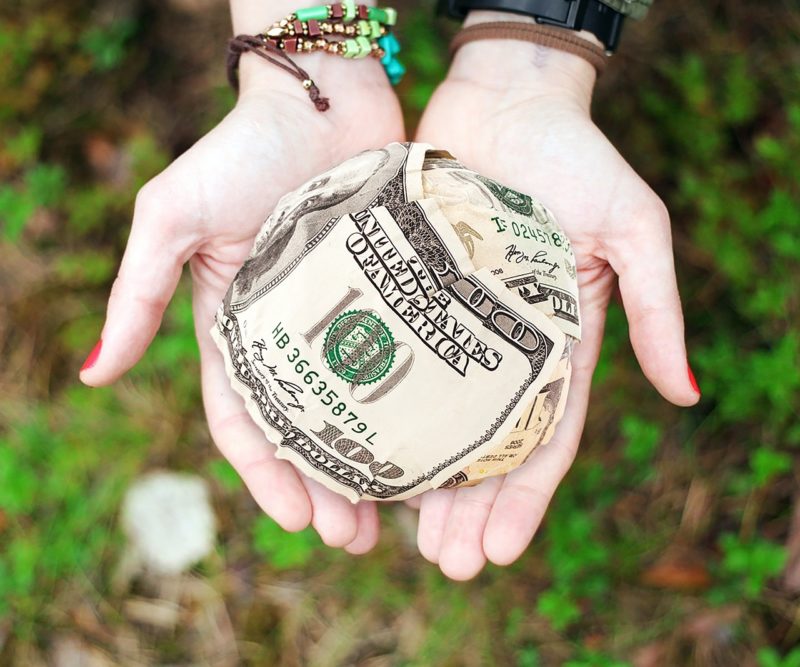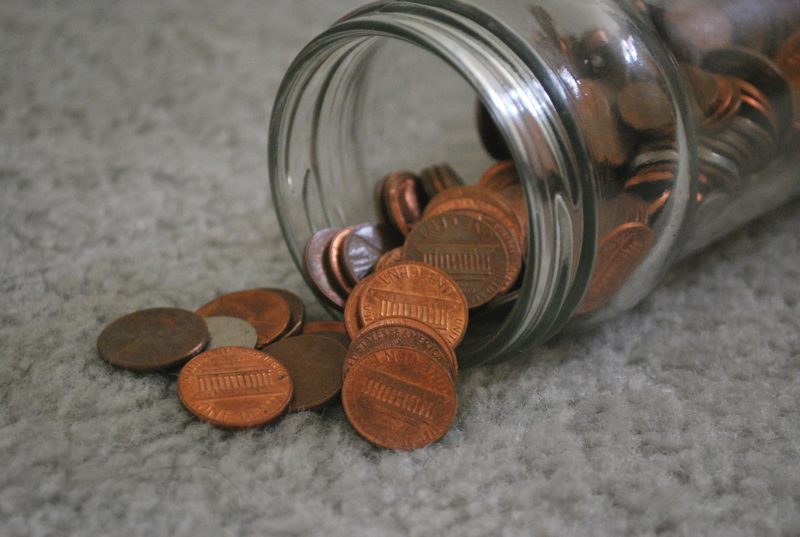When it gets down to brass tacks, you want to save money. All of the penny-pinching in the world is no good to you if you don't end up with something to show for it, but it seems like every time you build up an extra $500, a medical bill or car repair comes along and wipes you out again. Don't despair! There's a way out of this cycle. We're going to show you how to save $2000 in a year right now. Get out your notebook and prepare to save some money.
Why Save?
It's a valid question. If you're already getting by, and especially if you spend every cent you earn, having a savings goal may seem like a bridge too far. You may feel too old to start saving money if your goal is retirement. Don't let those naysayers in your head stop you from setting financial goals. There are lots of reasons to save money and it's never too late to start.
Have An Emergency Fund
You never know when trouble might come around. If you're living paycheck to paycheck, then you're not ready for unexpected expenses. Even saving a week of your income can help during a hard time. It's a good idea to have six months' worth of your salary saved just in case, but it's perfectly OK to start small. Sometimes, even an extra $25 can be the difference between a stressful near-miss and a true catastrophe.

Pay Off Debt
The average American carries over $5000 in credit card debt. Over half don't pay off their card every month. That means big fees. Getting on top of your credit card expenses alone can save you hundreds of dollars per year. If you're living hand to mouth, then you don't need these fees on top of your normal obligations.
Paying off other kinds of consumer debt can be liberating, too. From student loans to auto financing, they all represent a burden on your income. Saving and paying off your loans can also make your credit score soar. If your credit card seems impossible to overcome, check out our article on how to pay off $20,000 of credit card debt!
Save For Retirement
It's never too late to open a retirement account. Anybody can throw money into a savings account or even start an IRA. (If your goal is retirement, then you should probably plan to invest. Luckily, there are plenty of robo IRA managers out there that can make sure your portfolio will take care of you even if you have no clue what you're doing. We happen to have an article on that, too!)
Save For Your Goals
Do you want to send a child to college? Are you hoping to replace your car? Maybe you just want some extra money to spend on a vacation. There are lots of ways to save even if your plan for the money is epic. Read on to find out how to formulate your own savings plan and start socking away those dollars!

How To Save
There are lots of ways to start saving, even if your income is small and your expenses are large. Remember, we're looking for an annual savings of $2000 to start. Your goals may be bigger, but $2000 is a good start toward dealing with a debt issue, seeding a savings account, and working toward financial freedom. If your goals are smaller, we suggest setting $2000 as a goal anyway. That way, you'll end up with more money than you initially needed. Not only that but after a year, you'll be in the habit of saving. Developing a savings habit is a very healthy way to manage your personal finance. When you're not spending your entire paycheck every month, you'll quickly find that you feel more secure about the state of your checking account.
1. Make A Savings Plan
There are a lot of ways to save money. Not all of them will be right for you. Your success will depend upon your ability to sit down with a pencil and paper and figure out a few things about your financial life:
- How much money you currently have
- How much money you actually make every month
- What you spend that money on
- How much you want to save in what amount of time
That last question is easy: you're here to learn how to save $2000 in a year! Per month, that's about $167. (It's a good idea to overshoot your goal a little, so let's just think of that as $170.) Per week, it's about $43. Per day? $7. If it seems more doable to save $7 per day than to save $170 per month, then try to think of your plan like this.
2. Figure Out What Your Numbers Mean
However, before you know where you're going, make sure you know where you are. Add your savings and checking accounts, along with any investments or emergency cash that you might have socked away around the house. Then, subtract your debt. The resulting number is your net worth. If it's negative, then you know what your saving goal has to be. You're going to need to work your way into the black before you can start accumulating wealth.

Once you know your net worth, figure out what your monthly take-home salary is. If the amount of money you earn is variable, take an average of the past year. Then, make a list of everything that you need to spend money on. This includes everything from your gym membership to your rent to your grocery bill. If you're paying for it, put it on the list. On the same line, list the amount of money that you need every month to pay that bill. Add up your costs and compare them to your income. If you're spending more than you make, then it's time for some changes. If not, then you're already ahead of the game.
3. How Can You Reduce?
Some bills can't be squeezed. For example, not only do you have to pay rent, but it will only ever get more expensive. All you can do is determine the rate at which your rent will rise and plan to pay a higher price when it does. However, there are a lot of other ways to cut down.
Eating By The Budget Diet
Usually, people who are trying to save turn first to the grocery store. There's always cheaper food out there, and we here at The Budget Diet know a lot about eating cheaply. There's no need to live on ramen while you're trying to save. In fact, a lot of people get sick if they malnourish themselves in the name of saving money. There's no need to empty your flexible spending account or throw yourself into financial ruin because you were trying to cut down on the cost of good, healthy food. Of all the ways that you can reduce your grocery bill, your crock pot may be the best one. If you don't own a crockpot yet, start canvassing your local thrift stores. These handy kitchen gadgets pop up all the time in Goodwills, Savers, and Salvation Armies.
Although chips and white bread may seem the cheapest, you'll quickly eat through the money you've saved if you try to live on them. There's almost no nutrition in those foods, but lots of sugar. Your body will insist that it's still hungry even after you've stuffed yourself, and on top of that, it'll want more of those tasty chips. You'll get much more value for your money by buying actual potatoes, peas, chicken, and beans, and then cooking them together in your crockpot.

Buy In Bulk And Direct
When you can, buy in bulk. This can save you hundreds of dollars per year, especially if you stick to staples like rice, legumes, and fruit. Sometimes, farm shares can be a good option, too. These are partnerships where consumers (like you) get together and buy directly from a farmer. It's good for the farmer because they're guaranteed to sell their produce, good for you because you've cut out the middleman, and good for the environment because the food is almost always locally grown. Here's an example of one that sells a two-person share of veggies about $55 per month. With prices like that, you hardly have to wonder how to save $2000 in a year.
Finally, avoid frozen meals! These are never as cost-effective as they seem and are usually loaded with salt. Don't sacrifice your health tomorrow for your wallet today.
Avoid Eating Out
Eating out is one of the most expensive budget lines in America. It also gets missed a lot on budget sheets because people tend to grab some food out as needed. In big cities like New York and San Francisco, many people eat out as a matter of course. Sometimes, apartments in these super-expensive places just don't have kitchens large enough to accommodate any kind of cooking. However, even eating out cheaply can get very expensive. A $4 slice of pizza every day turns into $120 per month – and that's just dinner! $3 for drive-through breakfast everyday balloons into $90 per month. A $1 candy bar every day really costs you $30 per month. Already, the cost of eating out in that scenario exceeds our goal of $170 per month.
Consider the farm share we mentioned in the last section. It charges $55 for all the veggies that two people can eat in 30 days, including breakfast, lunch, and dinner! Buying bread for sandwiches, eggs, and meat might double that sum, meaning that if you stuck to home-cooked meals, a two-person family could spend $110 per month on food under the right circumstances. If you eat out instead, you'll spend upward of $200 – and that's just if you get the cheapest food out there. If you're springing for meals while out on the town, your bill could be much higher.

Finally, the cost of eating out hits you twice: first when you buy food that's been marked up, and then again when the other, healthier food that you bought at the grocery store goes bad. If you can eliminate eating out completely, you may see an immediate jump in your finances.
Cutting Down On Recreational Expenses
We need to make a little postscript here about alcohol, cigarettes, and recreational marijuana (where it's legal). While these intoxicants are a lot of fun and sometimes a good way to relax with friends, they're also very expensive. Reducing your usage or quitting entirely for a while can make a big difference to your finances. That's not to say that you shouldn't enjoy a drink or a puff now and then, but even cutting back a little can help while you're saving.
Simplify
There are a lot of small luxuries that we tend to take for granted in the 21st century. Take gym memberships, for example. Some of these can cost as little as $10 per month. Others can be upward of $50. Either way, they're giving you something that you can get on your own: exercise! Try running, walking, or working out at home instead of in an expensive building. If you've got an expensive cable package, consider downsizing to Internet service only. Netflix, Hulu, and other streaming services can still entertain you, and you may find that you don't miss flipping channels.
Look around your life. Do you really need the latest gadget, the most expensive latte, the brand-new clothes? The philosophy of minimalism has recently taken off for good reason. More stuff doesn't make anybody happy. It just makes you a little poorer and gives you more dusting to do.
While we can't necessarily recommend reducing your property down to 100 things, consider the fact that complex things tend to need more things, and those things tend to break and cost money to replace. A FitBit needs a charger and an iPhone that also needs a charger as well as an app. The chargers break, the iPhone and FitBit are obsolete in two years, and you'll eventually find yourself on the hook to buy them again. A Smart TV needs a table, a remote with batteries, and a high-speed Internet connection, and there's no point in having any of it unless you've got streaming video subscriptions. Those subscriptions themselves cost money every month, the batteries need to be changed, and Internet that fast costs extra.

Consider whether you'd be happier if you just chucked the stuff, especially the electronics.
4. Improving Your Income
You've reduced, reduced again, and reduced some more. Your income is finally in the black…but you're not saving anything. How frustrating.
First of all, pat yourself on the back! You're already doing some very hard work by changing your lifestyle and resolving to live debt-free. It's increasingly hard to get by in America, especially if you're making minimum wage. If you're not actively adding to your debt load, then good for you. Now let's get you some savings.
What Are Your Skills?
Remember how we wrote down all your income, debts, and savings earlier? Now we're going to do the same thing with your skills! Can you…
- Drive a car?
- Care for animals?
- Care for kids?
- Write well?
- Type?
- Speak a second language?
- Use Craigslist?
- Knit?
- Lose weight?

If you answered “yes” to any of these, then congratulations! You could earn some extra money. If you can drive, then you can drive for Lyft or Uber once a day. (Remember, you only need to make $7 every day to make $2000 in a year.) If your insurance company has a rewards app that gives you money if you drive safely, then pairing that with a Lyft side hustle can be a powerful tool.
If you can care for animals or kids, then you can pet-sit or babysit for cash. Look on local message boards and tap your religious or local community to find these kinds of gigs. Online marketplaces for writers, typists, and transcribers are booming – try Upwork and Freelancer to start. While you won't make much money, remember, once again, that you only need to make $7 extra per day to accumulate $2000 in a year. If you know a second language, you're at an advantage. Translators are valuable on the Internet.
If you can use Craigslist, then you can sell things online. So sell things online! You should also consider Ebay, Poshmark, Mercari, Letgo, and Wallapop for this purpose. Whether it's extra stuff from around your house, stuff you find at garage sales, flea markets, and thrift stores, or stuff you make, your junk can be lucrative. If you're crafty, consider selling your knitted, sewn, built, or painted items on Etsy.
Adventures In Earning Money
Finally, there are weirder ways to save money that actually work. HealthyWage and DietBet both pay you to lose weight. The idea is that you put up some money and bet that you can lose weight within a certain amount of time. If you do, you get a payout. If you don't – well, good-bye $5. This is a little risky, but if you're confident about your ability to lose weight, then it might be worth a shot. Jobber apps like TaskRabbit can put you to work doing random things for other people, often involving a delivery of some kind.

There are lots of ways to become a semi-professional guinea pig, too. Test subjects can get paid well for doing things like playing with toys and being mock jurors. Medical and psychological test subjects are also in high demand, and not all of these kinds of studies are as intense as the movies suggest. Some, like Yale studies, even happen online.
Finally, there are survey apps like InboxDollars, which pay you between $0.25 and $1 per survey taken. You won't make $7 per day on one of these, but between an occasional sale on Etsy, a job on TaskRabbit, a few pounds lost on HealthyWage, and a few surveys as you ride the train, you can build up the savings that will make your dreams come true.
Can you save $2000? YES!
It may seem like a high bar to clear, but you can absolutely save $2000. Whether you're digging your way out of debt or saving up for a goal, socking that money away will become easier as time goes on. If you start your plan today, you'll be $2000 richer in 365 days. So what are you waiting for?


